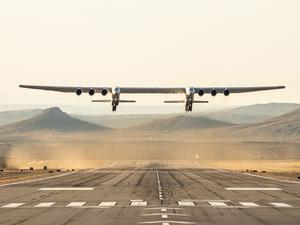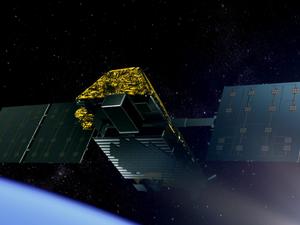
After launching its sixth satellite into space a week ago, Falls Church satellite company Lynk Global Inc. is finally on track to begin commercial operations by the end of the year.
The 5-year-old firm has gradually executed on its plan to put what are essentially cell towers in space. Doing so would increase connectivity in rural areas and parts of the world where cell service is non-existent and create a backup network for when cell towers on land aren’t functioning due to natural disaster, the company said. This sixth satellite will allow it to begin commercial operations, offering messaging only — without a broadband connection or calling feature — which in turn will drive more hiring, more office space and additional satellite launches in its near future.
In anticipation of quick growth following its commercial launch, the roughly 40-employee Lynk is looking to expand beyond the 9,300 square feet it occupies at 510 N. Washington Street in Falls Church. It’s grown its real estate footprint twice so far in Northern Virginia, and it’s looking to stay in the area, either by taking on additional floors or relocating.
“We expect to double our capacity soon, which is then likely to double again in 2023,” Charles Miller, Lynk CEO and co-founder said.
Much of that growth will be local, Miller said. After the company, formerly known as Ubiquitilink, closes its next funding round it will hire around 100 more employees, most of whom will also be based in the area, according to the CEO. To reach its goal of putting thousands of cell towers into space via satellite by late 2025 or early 2026 — which will allow it to expand its offerings to include broadband service — it’ll ultimately need to hire “thousands” of employees, Miller said. “It’ll ramp up. We won’t hire thousands overnight,” he added.
Lynk has gained attention and financial support from the likes of D.C. venture firm Revolution’s Rise of the Rest fund, which invested in the company in its first year. To date, Lynk has raised about $25 million through its Series A round, Miller said, adding that the firm is in “active discussions with a whole bunch of strategic investors” about its next round.
And it does need more funding, because so far, the company hasn’t generated any revenue. That will change this year, though, since it’s signed contracts worth $150 million with nine mobile network operators so far — including operators covering seven island countries in the Pacific and Caribbean — and is signing more at a pace of about one per month, Miller said. The natural disaster in Tonga earlier this year, which badly damaged the nation’s communications systems, accelerated conversations with operators, Lynk said in a release.
The company’s technology works with standard mobile phones, making it simpler to access in an emergency than a satellite phone, which requires a separate device or a modification to a cellphone.
“Nobody wants a second device,” Miller said. “We all want — and I want — our smartphones to do everything.”
He’s confident the pace of new contracts will continue as the company gears up to launch three more satellites this year. It’s already signed a deal with the U.S. Air Force, and “we are in conversation with all the big guys,” Miller said, referring to the major cellphone carriers in the U.S. and elsewhere. Some of those conversations “just take longer,” he said.




